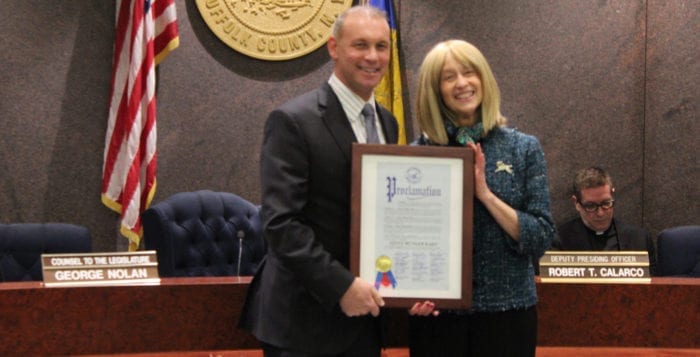A Huntington woman has taken to heart that Earth was made for all to enjoy, big and small, including man’s favorite four-legged friends.
Ginny Munger Kahn, president of Huntington-based The Long Island Dog Owners Group (LI-DOG), has been leading the way to create dog parks and dog-friendly park policies in Suffolk County since 2002. In her most recent victory, she convinced the Huntington Town Board to amend town code Aug. 15 to allow for on-leash walking of dogs in town parks.
“It is the highlight of my day to take my dog for a long walk,” Munger Kahn told TBR News Media in August. “I don’t want to do it just in my neighborhood on the street, but I want to be able to walk my dog in a beautiful public park. It’s been frustrating over the years on Long Island as many towns don’t allow it.”
Suffolk County Legislator Steve Stern (D-Dix Hills) said that Munger Kahn was one of the first constituents to sit down and have a meeting with him when he was elected to office. He has come to have a great deal of respect for her and LI-DOG.
“It has many volunteers and is an outstanding non-for-profit organization that does wonderful things not just for our furry friends and beloved family members, but I am sure everyone would agree sharing time in the outdoors with our pets is not just good for them, it’s good for all of us,” Stern said. “It’s good for all of us and our quality of life.”
Due to Munger Kahn’s activism, Stern was the leading sponsor on county legislation that directed the Suffolk parks commissioner to identify at least five parks where dog parks could be created in 2007. A decade later, there are 10 such parks on Long Island, seven of which are in Suffolk County including an off-leash beach, plus dozens of on-leash dog walking trails.
“The dog parks are large, attractive and very much appreciated by the people who use them every day,” Munger Kahn said.
Two of the local dog parks that have been created are at Blydenburgh County Park in Smithtown and West Hills County Park in Huntington.
“By expanding access to and enjoyment of Suffolk County’s beautiful parks and open spaces, Ginny Munger Kahn has helped to materially improve the quality of life of thousands of current and future Suffolk County residents,” reads a proclamation Stern gave to the LI-DOG president at the Dec. 19 county Legislature meeting. “In recognition of [that work], we, the members of the Suffolk County Legislature, do hereby honor Ginny Munger Kahn.”
Munger Kahn has been involved in changing laws and setting precedents not only at the county level, but the town. In 2013, her nonprofit organization supported the town’s dog walking trails initiative, which allowed on-leash dogs at select Huntington parks. But, she wanted more for her four-pawed friends.
“It was kind of crazy to have some parks in the Town of Huntington allow on-leash dogs and the vast majority of town-owned parks not to allow dogs on a leash,” Munger Kahn said in Aug. 2017. “This was confusing to people. The thought was if we adopted standards, a policy more closely aligned with Suffolk County’s policy, it would make enforcement easier.”
As LI-DOG’s representative on the Huntington Greenway Trails Citizens Advisory Committee, she pushed for the town to adopt more uniform park standards for leashed dogs in Huntington Town parks which was approved earlier this year, with two exceptions of Heckscher Park and Centerport’s Betty Allen Twin Pond Nature Park.
A perpetual advocate, Munger Kahn said she hopes once the town’s new policy is proven successful, she will be able to revisit regulations regarding Heckscher Park







